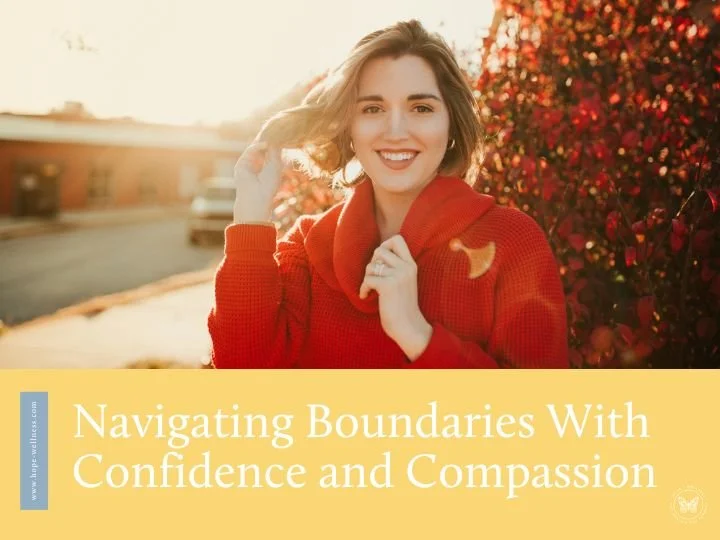
Hope +Wellness Blog
little snippets of advice for everyday challenges many people share

Boundaries 101: Navigating Boundaries With Confidence and Compassion
Setting boundaries takes practice and compassion, but it’s possible to feel more confident in your ability to communicate your limits.

How to Be Okay With Saying No
It can be hard to break out of a pattern where you feel like you can’t ever say no, even to honor your own boundaries. Here are some tips to help you feel comfortable and confident saying no.

Are Your Boundaries Too Firm?
Think of them less like a fence surrounding and protecting you, and more like pillars holding up a structure. They are crucial to the stability of your relationship, but they leave space open for others to come in. And when a boundary is violated, it is less like the fence surrounding you has been smashed, leaving you completely vulnerable, and more like one of the pillars holding up the structure of your relationship has been damaged. The entire thing doesn’t have to come crumbling down if you can work to repair what was hurt.
Hope+Wellness is a mental health practice specializing in the treatment of depression, mood, stress, and anxiety in kids, teens, and adults. This is a blog about living well and finding meaning and purpose in the face of difficult challenges. This is a blog about finding hope.
Archive
- ACT
- ADHD
- Acceptance
- Anxiety
- Authenticity
- Belonging
- Bipolar
- CBT
- Calming
- Change
- Chronic Illness
- Chronic Pain
- Communication
- Community
- Coping Skills
- DBT
- Dating
- Depression
- EMDR
- Emotions
- Entrepreneurs
- Friendship
- Gratitude
- Grief
- Health Psychology
- Hope
- Inspiration
- Intimacy
- Intuition
- Joy
- Letting Go
- Love
- Manic Depression
- Mindfulness
- Miscarriage
- OCD
- Parenting
- Personal Growth
- Positive Vibes
- Quotes
- Relationships
- Resources
- Self-Compassion
- Self-Reflection
- Services
- Sleep
- Spirituality
- Stress Management
- Stress Relief
- Suffering